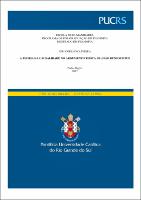| Compartilhe o registro |


|
Use este identificador para citar ou linkar para este item:
https://tede2.pucrs.br/tede2/handle/tede/7757Registro completo de metadados
| Campo DC | Valor | Idioma |
|---|---|---|
| dc.creator | Oliveira, Iuri Coelho | - |
| dc.creator.Lattes | http://buscatextual.cnpq.br/buscatextual/visualizacv.do?id=K4473259Z0 | por |
| dc.contributor.advisor1 | Pich, Roberto Hofmeister | - |
| dc.date.accessioned | 2017-12-01T13:17:04Z | - |
| dc.date.issued | 2017-08-31 | - |
| dc.identifier.uri | http://tede2.pucrs.br/tede2/handle/tede/7757 | - |
| dc.description.resumo | Este estudo tem em vista desenvolver dois conceitos-chave para o argumento teísta de João Duns Scotus, a saber, o de causas essencialmente ordenadas (ceo) e o de causas acidentalmente ordenadas (cao). Estes conceitos aparecem tanto nas diferentes versões de seu argumento (Lect., Ord., Rep. I-A e TPP) quanto em uma passagem de seu comentário à Metafísica de Aristóteles. Assim, em primeiro lugar, é preciso tratar em sentido geral das caraterísticas destes textos e onde, nos mesmos, aqueles conceitos aparecem, além de indicar como a estrutura do argumento teísta de Scotus leva-o à causalidade. Em segundo, é importante dedicar um pouco de atenção às fontes doutrinais em que Scotus se baseou para formulá-los, a saber, Aristóteles e Avicena, mostrando em que as noções scotistas se aproximam e em que se afastam das de suas fontes, além de esclarecer as diferenças indicadas por Scotus entre as ceo e as cao, de um lado, e as causas per se e per accidens, de outro. Por fim, trata-se exclusivamente das ceo e das cao, inicialmente, apresentando as características dos membros de cada série causal em seus respectivos processos de atuação; a seguir, estuda - se como estas causas se estruturam enquanto séries, onde se inicia o tratamento do vínculo de ambas com a Causa Primeira através de três proposições em que se prova a finidade das ceo, a possível infinidade das cao e como a Causa Primeira atua em relação a estas duas séries causais. Conclui-se então o capítulo tratando das características exclusivas da Causa Prima em sua relação com as outras (ceo e cao), e de como estas duas séries contribuem para uma teoria causal no argumento teísta de Duns Scotus. | por |
| dc.description.abstract | This study aims to develop two key concepts for the theistic argument of John Duns Scotus, namely that of essentially ordered causes (ceo) and that of accidentally ordered causes (cao). These concepts appear in both the different versions of his argument (Lect., Ord., Rep. I-A e TPP) as well as in a passage from his commentary on Aristotle’s Metaphysics. Thus, first of all, it is necessary to treat in a general sense the characteristics of these texts and to say where, in themselves, those concepts are found, besides indicating how the frame of the theistic argument of Scotus leads him to causality. Secondly, it is important to devote a little attention to the doctrinal sources on which Scotus based himself to formulate his own concepts, namely on Aristotle and Avicenna. In this chapter it is also shown in which the Scotistic notions approach and depart from those of his sources. In addition, the differences indicated by Scotus between the ceo and cao, on the one hand, and per se and per accidens causes, on the other, are clarified. Finally, it deals exclusively with ceo and cao, initially, presenting the characteristics of the members of each causal series in their respective processes of action; then, it is studied how these causes are structured as series, where the treatment of the bond of both with the First Cause is initiated through three propositions in which the fineness of the ceo is proved, the possible infinity of the cao and how the First Cause acts in relation to these two causal series. This chapter is finished discussing the exclusive characteristics of the Causa Prima in its relation to the others (ceo and cao), and saying how these two series contribute to a causal theory in theistic argument of Duns Scotus. | eng |
| dc.description.provenance | Submitted by PPG Filosofia ([email protected]) on 2017-11-24T12:51:18Z No. of bitstreams: 1 DIS_IURI COELHO OLIVEIRA_COMPLETO.pdf: 1662744 bytes, checksum: 675c0cc2e152bbef478b5b960d034479 (MD5) | eng |
| dc.description.provenance | Approved for entry into archive by Caroline Xavier ([email protected]) on 2017-12-01T13:12:02Z (GMT) No. of bitstreams: 1 DIS_IURI COELHO OLIVEIRA_COMPLETO.pdf: 1662744 bytes, checksum: 675c0cc2e152bbef478b5b960d034479 (MD5) | eng |
| dc.description.provenance | Made available in DSpace on 2017-12-01T13:17:04Z (GMT). No. of bitstreams: 1 DIS_IURI COELHO OLIVEIRA_COMPLETO.pdf: 1662744 bytes, checksum: 675c0cc2e152bbef478b5b960d034479 (MD5) Previous issue date: 2017-08-31 | eng |
| dc.description.sponsorship | Conselho Nacional de Pesquisa e Desenvolvimento Científico e Tecnológico - CNPq | por |
| dc.format | application/pdf | * |
| dc.thumbnail.url | http://tede2.pucrs.br:80/tede2/retrieve/170409/DIS_IURI_COELHO_OLIVEIRA_CONFIDENCIAL.pdf.jpg | * |
| dc.thumbnail.url | https://tede2.pucrs.br/tede2/retrieve/186101/DIS_IURI_COELHO_OLIVEIRA_COMPLETO.pdf.jpg | * |
| dc.language | por | por |
| dc.publisher | Pontifícia Universidade Católica do Rio Grande do Sul | por |
| dc.publisher.department | Escola de Humanidades | por |
| dc.publisher.country | Brasil | por |
| dc.publisher.initials | PUCRS | por |
| dc.publisher.program | Programa de Pós-Graduação em Filosofia | por |
| dc.rights | Acesso Aberto | por |
| dc.subject | Argumento Teísta | por |
| dc.subject | Teoria Causal | por |
| dc.subject | João Duns Scotus | por |
| dc.subject.cnpq | CIENCIAS HUMANAS::FILOSOFIA | por |
| dc.title | A teoria da causalidade no argumento teísta de João Duns Scotus | por |
| dc.type | Dissertação | por |
| dc.restricao.situacao | Trabalho será publicado como artigo ou livro | por |
| dc.restricao.prazo | 60 meses | por |
| dc.restricao.dataliberacao | 01/12/2022 | por |
| Aparece nas coleções: | Programa de Pós-Graduação em Filosofia | |
Arquivos associados a este item:
| Arquivo | Descrição | Tamanho | Formato | |
|---|---|---|---|---|
| DIS_IURI_COELHO_OLIVEIRA_COMPLETO.pdf | IURI_COELHO_OLIVEIRA_DIS | 1,62 MB | Adobe PDF |  Baixar/Abrir Pré-Visualizar |
Os itens no repositório estão protegidos por copyright, com todos os direitos reservados, salvo quando é indicado o contrário.




